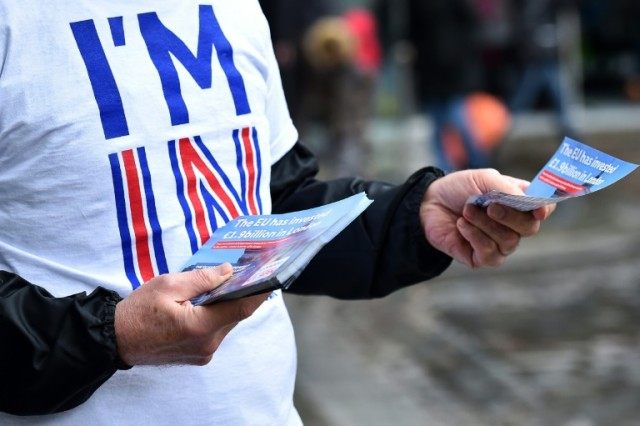London (AFP) – A time traveller from 1975 would find Britain’s EU referendum strikingly familiar — except that the two main parties have swapped roles on whether or not to remain in the bloc.
A prime minister, trying to appease the Eurosceptic wing of his fractured party, calls a vote on membership and encourages Britons to stay in, after securing some concessions from Brussels.
But back in 1975, when Britain voted on whether to stay in the European Economic Community it had joined two years earlier, it was a Labour prime minister calling the vote rather than a Conservative one.
In the June 5, 1975 referendum, 67 percent followed Harold Wilson’s advice to stay in the EEC — a result Conservative Prime Minister David Cameron would be more than happy with from the June 23 vote this year.
The Conservative opposition, under their new leader Margaret Thatcher, staunchly defended Britain’s EEC membership, with the Iron Lady even seen campaigning in a jumper with the nine member states’ flags on.
She accused Labour of putting Britain’s future at risk in a bid to end their own infighting.
“The referendum is a tactical device to get over a split in their own party,” she told parliament.
Her transformation to visceral euroscepticism was still 15 years into the future.
Today, the infighting is in the Conservative ranks, while Labour is broadly united in defending Britain’s place in the European Union, the successor to the EEC.
Jeremy Corbyn, the socialist leader of the opposition Labour Party, spelled out his reasons for staying in on Thursday — despite a long personal track record of Euroscepticism, including voting out in 1975.
“In contrast to four decades ago, the EU of today brings together most of the countries of Europe and has developed important employment, environmental and consumer protections,” he said.
Professor Sara Hobolt, a European politics expert at the London School of Economics university, said the EU nowadays is about much more than just free trade, the main concern of its EEC predecessor.
“Centre-left parties in Europe find it easier to be pro-EU today than they did in the 1970s,” she said.
– Europe has also changed –
The European geopolitical landscape has also changed radically since 1975.
The European community has swelled from its original six members to the 28 of today, with more queuing up to join.
The Iron Curtain has fallen and 19 member states share the euro currency, while 22 have abolished border controls between each other.
Some 3.3 million citizens of other EU countries now live in Britain, with no need for a work permit.
Both Wilson and Cameron recommended staying in, in the face of some of their cabinet members.
Four of the 21 currently serving under Cameron are campaigning to leave, while 128 of the 330 Conservative MPs back withdrawal.
Under Wilson, many Labour MPs feared that if Britain stayed in, it would lose its independence and workers’ rights.
– An unfinished debate –
“Our concern then was that membership would mean a one-way loss of sovereignty and investment. This has proved unfounded,” said Neil Kinnock, Margaret Beckett, David Blunkett, Jack Straw and Hilary Benn in a recent open letter: five prominent Labour figures who voted out in 1975 and are now voting in.
Back then, Conservatives thought Britain would be safer from the Soviet-led communist bloc if it was in the EEC.
Many today think the kingdom is now under threat from “uncontrolled immigration” — chiefly from those same ex-communist countries.
Campaign leaflets from today and 41 years ago touch on the same issues: national sovereignty, the economy and jobs.
The big exception is immigration from other parts of Europe, which dominates the current debate.
Wilson’s gamble paid off with the referendum result, but his victory declaration that it was an “historic day, one that had settled 14 years of arguments”, has not come true.
The row is still going on, and Britain is still the big country in the EU where euroscepticism is arguably the strongest.

COMMENTS
Please let us know if you're having issues with commenting.